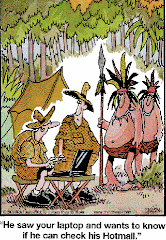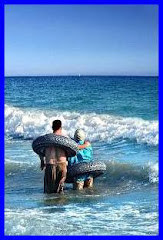
COMESA? C’est ‘comment ça va’?
By Hoda Nassef
COMESA means: making a difference in Egypt’s economy…
Eng. Hatem Hussein Mohamed, known simply as Hatem Hussein, was born in Egypt on the 18th of November 1962. He was educated in Cairo and attained his B.Sc. degree in Mechanical Engineering from the Zagazig University. His post-graduate studies were in Production Management and Design where he completed his M.Sc. courses from the same university.
Always extremely ambitious in self-amelioration, although he started his career in marketing of engineering products, he continued studying marketing in Egypt, as well as Business and Marketing Planning in comprehensive courses by correspondence. He has his own business now; is currently a Marketing and Management Consultant and Chairman of HMC Consultants in Cairo.
Hussein’s extensive experience in marketing management and business development enabled him to be singled out by various prestigious companies for enhancing their business revenues and trade, leading them to outstanding success in the Egyptian and African Markets. But, let’s begin at the beginning, and discover together how this soft-spoken man treads loudly, with his perseverance, ambitions, and visionary targets.
Boy Scouts
History recounts that British Robert Baden-Powell was the actual founder of Boy Scouts, whereas USA sources disclaimed this fact with their concept that the Red Indians were the natural pioneers in scouting. In any case, whoever is the Father of Boy Scouts is not the issue here. Robert Baden-Powell, founded his Boy Scouts around the beginning of the 20th century. Egypt was one of the first foreign and Middle Eastern country to form its own Boy Scouts at the turn of the Twentieth Century, only a few years after it was first introduced.
Eng. Hatem Hussein joined the Boy Scouts as a little boy. He was also the youngest Boy Scout (8 years old) to receive honorary acclaim as a leader of his team. Hussein spent most of those days in camps and scout gatherings until he became a scout leader. As an adult, in 1980, and as a member of the Engineers’ Syndicate, he formed a group of boy scouts (sons of the Members of the Engineers’ Syndicate), and was involved in the scout movement in Egypt up until 1993.
Joining the family business
Still a leader as an adult, Hussein joined his family business while studying at University. Through his power of persuasion, he managed to introduce and import into Egypt the first electronic taximeters, in which he gained the highest market share (26.6 per cent) at the end of the first year. He is the Chairman of H.A. TRADE, U.K. Limited, in London, and also a board member in HATRADE Engineering, Cairo, and Adaptive-Link Corporation, in California, USA.
Introducing new central air-conditioning systems into Egypt
At the time where only famous American brands were heard of and accepted in Egypt, such as Carrier, Trane, York, etc., Eng. Hussein managed to bring into the Egyptian market the first Korean central air-conditioning brand. Not only that, but it was soon accepted as an equal brand in its quality, and rivalled its competitors on an international basis.
Various venues
Eng. Hussein is the publisher and editor-in-chief of the first local English magazine dealing in the tourism industry, hotels, and hospitality in general. “Hospitality, Egypt” first came out in 1998, and ran for 3 continuous years, on a monthly basis during the first year, then seasonally, for the last two years. “Hospitality, Egypt” will now be accessible electronically, for millions of readers throughout the world.
To add to this interesting and variable career, Eng. Hussein is a member of the American Marketing Association (AMA), the Egyptian Engineers’ Syndicate (as previously mentioned), the Egyptian Society of Mechanical Engineers, and The Strategic Management society (SMS). He is also often the Spokesman for Transmar Shipping Co. at the EBA (Egyptian Businessmen’s Association).
Transmar Shipping Co., S.A.E. & IACC
It is well known that Egypt is a pioneer in various initiatives, such as linking all African states through the development of information technology (IT), and through shipping lines for COMESA. In the capacity of Marketing Consultant, Eng. Hussein helped launch the first cargo shipping line from Egypt to East Africa and ran a promotional campaign in Egypt, Kenya, Uganda and Tanzania.
Furthermore, unlike other cargo lines, the 100% Egyptian Transmar Shipping Line now has a scheduled route to and from the African Ports, whether they are carrying enough cargo or not, which is a unique maritime cargo service not applied to other general cargoes. It gives an opportunity for the African countries in which the ships dock, because they will always have the option to ship their goods within this itinerary and at scheduled dates.
I asked Eng. Hussein what products do we import from East Africa, and he stated plenty, but mainly tea from Kenya, and copper from Zambia. And, I asked him, to his expert knowledge, what is being done to improve bilateral relations between Egypt and Kenya in trade, as well as Egypt with other African countries. He answered that in the past three years, ever since the Transmar Shipping Line was launched in August 1999, Kenya (Mombassa) and then Tanzania (Dar Es-Salaam) were the first African ports on the map. During the last three years, both countries have learnt from the negative and positive aspects. For example, the Egyptian side complained about the ‘delaying tactics’ (in discharging the consignments) whereas the Kenyan side complained about the heavy tax and custom duties imposed on their products every now and then.
Egypt officially Joins COMESA in February 1999
In February 1999, Egypt became an official member of the COMESA (Common Market for Eastern and Southern Africa). During that same year, IACC was selected to establish the official COMESA shipping line, in August 1999. The Transmar vessels depart from the Port of Suez, and pass by the new Ein El-Shokhna Port, and El-Adabaya Port (where office headquarters of Transmar Shipping Company are situated) as well.
President Hosni Mubarak
President Hosni Mubarak presided over the 6th Summit of COMESA in 2000. Egypt's major local newspapers concentrated on the COMESA Summit; the first meeting after it has launched its Free Trade Zone in October 2000 and COMESA shipping lines. President Mohamed Hosni Mubarak declared in his speech during the opening ceremony of the 2-day COMESA Summit that Egypt played a major role in launching a regular African shipping line for COMESA member countries, which commenced in August 1999. This route serves the countries in the destination ports of Sudan, Djibouti, Dar Es-Salaam, and Mombassa, as well as inland neighbouring African countries without ports on the Indian Ocean.
Addressing the inaugural session, President Hosni Mubarak emphasized on Egypt's commitment to help the economic bloc achieve integration as a key step towards establishing an African economic unity called for by the 1991 Abuja Treaty. The Egyptian leader also emphasized that to face the globalisation-related challenges, the participating African countries should quickly move onto the next phase by establishing a untied customs regime by the year 2004.
President Mubarak added that the success of the Free Trade Zone that was inaugurated on 31 October 2000 among nine COMESA members would encourage other COMESA countries to join. He concluded that COMESA countries should work together to provide "an atmosphere of regional security and stability needed to attract more foreign investments."
Egyptian Businessmen’s Association (EBA)
Eng. Hatem Hussein said: “The Egyptian Businessmen’s Association is a non-governmental and non-profit organisation. It includes 450 members and approximately 1,300 private sector companies. There are fourteen specialized committees within the EBA, (such as the Tax & Custom Committee, The African Relations Committee, and many more for all branches of business activities and interests) and Mr. Moustafa El-Ahwal (President of the IACC) is Chairman of the Transport Committee. The members of the EBA play a major role in the contribution of the amelioration of the Egyptian economy; they export 60% of all Egyptian exports (excluding crude oil) and import 50% of all imports.”
“The Transmar Delegation was present at the COMESA 6th Summit in Cairo, which was attended by heads of state, prime ministers and representatives from 20 African countries. In an unofficial capacity, Transmar delegation made a point of attending also the COMESA Forum, which was headed and addressed by Dr. Youssef Botros Ghali, Minister of Trade, and Mr. Mohamed Shafik Gabr, Chairman of the COMESA Business Council.
Furthermore, COMESA agreed on creating a data network of small industries, as stated by Mr. Ahmed Salam, who is head of the Small Industries Cooperative Association. The network will be based in four locations: Cairo (for East Africa), Lusaka (for South Africa), Nairobi (for Central Africa), and Mauritius (for Indian Ocean countries.) This would provide information about small industries in COMESA member states and enable businessmen to promote their products and enhance pan-African trade exchange, instead of importing non-African goods.
As Chairman of the Transport Committee in the EBA, Eng. Mostafa El-Ahwal emphasized the importance and benefits of Maritime transport for member countries of COMESA in general,” Hussein concluded. In his recent trip to Kenya, El-Ahwal’s speech mentioned that Kenya has become a very important business partner (to Egypt), as now there are no duties on imports from COMESA among nine countries in the Free Trade Area (FTA). Egypt and Kenya are amongst these nine countries.
Egyptian-Tanzanian Future Projects
There are also seventeen ‘business councils’ within the EBA with different associations and counterparts all over the world. It is noteworthy to mention that Eng. Hatem Hussein helped formulate the recent Egyptian-Kenyan Business Council, after his recent trip with the Businessmen Delegation (lasting from 27 September to 6 October 2002) as a Transmar Consultant.
Furthermore, although Tanzania withdrew from COMESA, during this recent voyage to Tanzania as well, Eng. Hatem Hussein along with Mr. Moustafa El-Ahwal, President of IACC and Chairman of the Transport Committee within the EBA had formed (and officially signed) an Egyptian-Tanzanian Business Council, whereby both countries would benefit in mutual trade through importation and exportation of their goods, via the Transmar Shipping Company.
Marketing Advice
“What, in your opinion, Mr. Hatem, could we export to a better advantage and its full capacity?” I asked.
He answered, “Of course, textiles here are excellent, such as our famous cotton, also ceramic tiles, carpets and sanitary ware. We also have excellent marble and granite. But, our mistake is to export it as raw material in blocks, instead of sending finished products to the end-users (consumers).” And, by that, he explained that we have opportunities in countries like China for the finished products of marble.
The problem facing exporters also lies in the fact that if we want to make factories here in Egypt for finished products, heavy custom duties and taxes are enforced for all the parts and machinery imported, in making such factories. He suggested that factory owners should be fully or partially exempted from the tax and custom fees imposed on the imported machinery and parts, which would enable them to set up their factories.
Hussein stated that even foreign goods exported to, or imported from African countries, is becoming a problem, and increasingly more expensive to the African countries, to the point that Egypt is becoming one of the most expensive countries to deal with. He said that this increase in custom duties is tempting African countries, as well as European countries, to import their goods from other Far Eastern and Middle-Eastern countries, rather than from Egypt, consequently resulting in increased products prices in Egypt, in a vicious circle. Another aspect that is becoming an obstacle to smooth commerce in foreign trade is the never-ending bureaucracy, which could also be harmful to foodstuff if delayed in airports.
Hussein is proud to be a member and Marketing Consultant for IACC and Transmar Shipping Company. He said, “We encountered a lot of difficulties during our first year, after the first Transmar vessel was launched three years ago, and set out on its first voyage in August 1999. But, I firmly believe that this multi-purpose cargo liner is helping in bilateral foreign trade between Egypt and African countries, and has contributed positively in the cargo movement, as well as strengthened political and economical ties.”
On a personal and home basis, in Management, what he likes best about Mr. Moustafa El-Ahwal’s policy, is “investing in human resources” as well as continuously training his staff. “He’s an excellent man to work with,” Hussein concluded.
Future Plans & Aspirations
When I asked him what were his plans and hopes for the future, Eng. Hatem Hussein modestly said, “I am only a small drop in the ocean, but I hope somehow to make a mark in the field of Egyptian exportation. In the capacity as a Marketing Consultant, I intend to participate with the Egyptian exporters to explore different exportation venues for the Egyptian market, thus help in the expansion and improvement of Egypt’s economy.
At Berth
Getting back to ‘home base’, I wanted to know more about the personal side of Hatem Hussein, so I asked him what were his hobbies, preferred music, colours, special weekend getaways, etc.
First, he said he loved to learn anything new, and to study. I remarked that it was a good time, then, to start thinking about a PhD, as he was still young, and this would satisfy his natural yearn for continuous self-amelioration, and he agreed. (So, go for it, Eng. Hussein!)
As for music, he said he used to have a band (with African musicians!) during his college days, and was the lead singer, or sang along, while playing on the ‘keyboard’ (electronic organ). He still likes to rap (or ‘jam’) for fun, amongst friends and family members. (I should have guessed this, with his gentle voice.) He laughed and said that during his last voyage last September-October to Kenya and Tanzania, he raggaed and rapped with a local Tanzanian band there. The Tanzanian TV even interviewed Eng. Hussein “as an Egyptian musician”, rather than being a member of the Egyptian business delegation over there.
He loves all types of music, including African, modern, and some old Arabic classics. His favourite colours are dark (red, blue, etc.) – don’t forget, he’s a Scorpio! His hobbies include swimming, and deep sea diving, which he learnt a few years ago. Whenever he can get away with his family, friends, or alone, he simply adores Sharm El-Sheikh.
For a closer and faster getaway, his next choice would be Ras Sidr (Sudr). He said, “The minute I pass through the Ahmed Hamdy Tunnel, I breathe a big sigh of relief. It’s like as if I’m going to another planet!” Stay just where you are, Eng. Hatem Hussein - Egypt needs ambitious and dedicated men, just like you!
Although Eng. Hatem Hussein has left IACC & Transmar Shipping Company to work on his own, his marketing consultancy service remains available to all. For marketing consultancy, you can contact him on his mobile: 0123101091
H.N.


























































































































